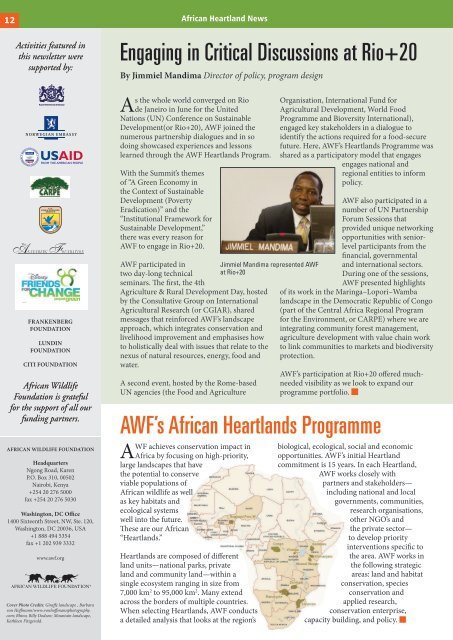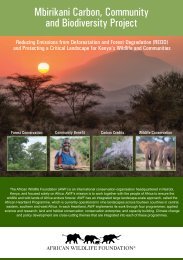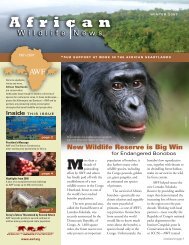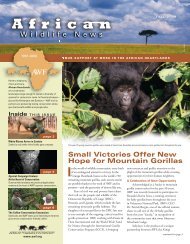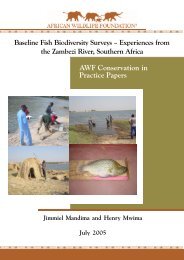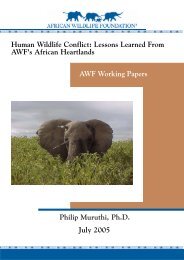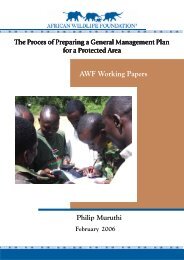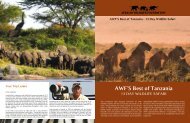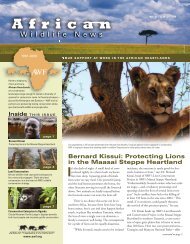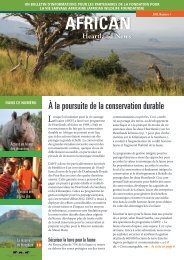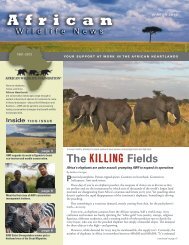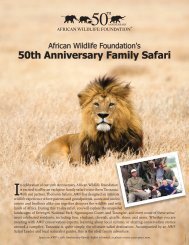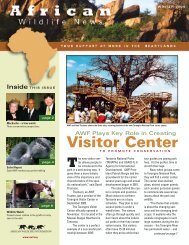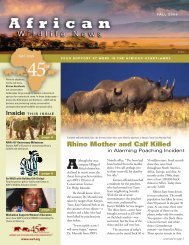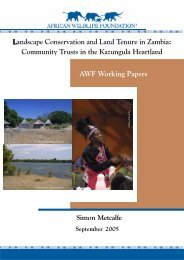Download (English) - African Wildlife Foundation
Download (English) - African Wildlife Foundation
Download (English) - African Wildlife Foundation
Create successful ePaper yourself
Turn your PDF publications into a flip-book with our unique Google optimized e-Paper software.
12<br />
2 <strong>African</strong> Heartland News<br />
<strong>African</strong> Heartland News<br />
Activities featured in<br />
this newsletter were<br />
supported by:<br />
FrANKENBErg<br />
<strong>Foundation</strong><br />
LUNDIN<br />
FOUNDATION<br />
CITI FOUNDATION<br />
<strong>African</strong> <strong>Wildlife</strong><br />
<strong>Foundation</strong> is grateful<br />
for the support of all our<br />
funding partners.<br />
<strong>African</strong> <strong>Wildlife</strong> <strong>Foundation</strong><br />
Headquarters<br />
Ngong Road, Karen<br />
P.O. Box 310, 00502<br />
Nairobi, Kenya<br />
+254 20 276 5000<br />
fax +254 20 276 5030<br />
Washington, DC Office<br />
1400 Sixteenth Street, NW, Ste. 120,<br />
Washington, DC 20036, USA<br />
+1 888 494 5354<br />
fax +1 202 939 3332<br />
www.awf.org<br />
Cover Photo Credits: Giraffe landscape , Barbara<br />
von Hoffmann/www.vonhoffmannphotography.<br />
com; Rhino, Billy Dodson; Mountain landscape,<br />
Kathleen Fitzgerald.<br />
Engaging in Critical Discussions at Rio+20<br />
By Jimmiel Mandima Director of policy, program design<br />
As the whole world converged on Rio<br />
de Janeiro in June for the United<br />
Nations (UN) Conference on Sustainable<br />
Development(or Rio+20), AWF joined the<br />
numerous partnership dialogues and in so<br />
doing showcased experiences and lessons<br />
learned through the AWF Heartlands Program.<br />
With the Summit’s themes<br />
of “A Green Economy in<br />
the Context of Sustainable<br />
Development (Poverty<br />
Eradication)” and the<br />
“Institutional Framework for<br />
Sustainable Development,”<br />
there was every reason for<br />
AWF to engage in Rio+20.<br />
AWF participated in<br />
two day-long technical<br />
seminars. The first, the 4th<br />
Agriculture & Rural Development Day, hosted<br />
by the Consultative Group on International<br />
Agricultural Research (or CGIAR), shared<br />
messages that reinforced AWF’s landscape<br />
approach, which integrates conservation and<br />
livelihood improvement and emphasises how<br />
to holistically deal with issues that relate to the<br />
nexus of natural resources, energy, food and<br />
water.<br />
A second event, hosted by the Rome-based<br />
UN agencies (the Food and Agriculture<br />
AWF’s <strong>African</strong> Heartlands Programme<br />
AWF achieves conservation impact in<br />
Africa by focusing on high-priority,<br />
large landscapes that have<br />
the potential to conserve<br />
viable populations of<br />
<strong>African</strong> wildlife as well<br />
as key habitats and<br />
ecological systems<br />
well into the future.<br />
These are our <strong>African</strong><br />
“Heartlands.”<br />
Heartlands are composed of different<br />
land units—national parks, private<br />
land and community land—within a<br />
single ecosystem ranging in size from<br />
7,000 km 2 to 95,000 km 2 . Many extend<br />
across the borders of multiple countries.<br />
When selecting Heartlands, AWF conducts<br />
a detailed analysis that looks at the region’s<br />
Organisation, International Fund for<br />
Agricultural Development, World Food<br />
Programme and Bioversity International),<br />
engaged key stakeholders in a dialogue to<br />
identify the actions required for a food-secure<br />
future. Here, AWF’s Heartlands Programme was<br />
shared as a participatory model that engages<br />
engages national and<br />
regional entities to inform<br />
policy.<br />
AWF also participated in a<br />
number of UN Partnership<br />
Forum Sessions that<br />
provided unique networking<br />
opportunities with seniorlevel<br />
participants from the<br />
financial, governmental<br />
and international sectors.<br />
During one of the sessions,<br />
AWF presented highlights<br />
of its work in the Maringa–Lopori–Wamba<br />
landscape in the Democratic Republic of Congo<br />
(part of the Central Africa Regional Program<br />
for the Environment, or CARPE) where we are<br />
integrating community forest management,<br />
agriculture development with value chain work<br />
to link communities to markets and biodiversity<br />
protection.<br />
AWF’s participation at Rio+20 offered muchneeded<br />
visibility as we look to expand our<br />
programme portfolio. m<br />
biological, ecological, social and economic<br />
opportunities. AWF’s initial Heartland<br />
commitment is 15 years. In each Heartland,<br />
AWF works closely with<br />
partners and stakeholders—<br />
including national and local<br />
governments, communities,<br />
research organisations,<br />
other NGO’s and<br />
the private sector—<br />
to develop priority<br />
interventions specific to<br />
the area. AWF works in<br />
the following strategic<br />
areas: land and habitat<br />
conservation, species<br />
conservation and<br />
applied research,<br />
conservation enterprise,<br />
capacity building, and policy. m


